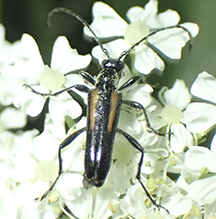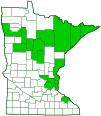strangalepta flower longhorn beetle
(Strangalepta abbreviata)
Conservation • Description • Habitat • Ecology • Distribution • Taxonomy
|
|
||||||||||||||
Description |
Strangalepta flower longhorn beetle is a common, medium-sized, early season beetle. It is the only species in the genus Strangalepta. It occurs in the United States from Maine to northern Georgia, west to Minnesota and Illinois. In the southeast it is mostly restricted to the Appalachian Mountain range. It also occurs in southern Canada from Nova Scotia west to Ontario. The larvae feed on decaying wood of various hardwoods and conifers. They bore into the wood and can cause damage to felled logs. Adults are found from May through July mostly in forests and woodlands. They feed on flower pollen, stamens, and nectar. Adults are black, shiny, and ⅜″ to 9⁄16″ (10.0 to 14.0 mm) in length. They are shiny and black, usually with a variable amount of yellowish, beige, or brick red (pale) markings. The head is angled forward in front and is abruptly constricted in back forming a neck that is visible when viewed from above. The compound eyes are large, black, and deeply notched around the antennae bases. The antennae are thread-like and long, at least half as long as the body. They are usually entirely black, sometimes pale toward the tip. The upper thoracic shield (pronotum) is entirely black and somewhat hemispherical, almost round when viewed from above, and rounded above when viewed from the side. There is no collar or constriction behind the head. The hardened wing covers (elytra) are widened at the front, “broad shouldered”, slightly tapered toward the rear, and rounded at the tip. Most individuals have a pale longitudinal stripe on the basal two-thirds of each elytron. The “abbreviated” stripe is the feature that gives this beetle its species epithet. On some individuals, the elytra are entirely black. On some, they are mostly pale. The pronotum and elytra are shallowly pitted (punctate) and are covered with short fine hairs. The legs are long, slender, black, and shiny. The fourth segment (tibia) of each leg has a spur at the tip. On the male, The tibiae on the hind leg has a small bump (tubercle) on the inside. The last part of each leg (tarsus), corresponding to the foot, has five segments but the fourth segment is minute and is concealed within the lobes of the heart-shaped third segment, making it appear that there are only four segments. |
Size |
⅜″ to 9⁄16″ (10.0 to 14.0 mm) |
Similar Species |
Habitat |
Forests and woodlands |
Ecology |
Season |
May through July |
Behavior |
Adults are active during the day |
Life Cycle |
|
Larva Food |
Decaying wood |
Adult Food |
Flower pollen, stamens, and nectar |
Distribution |
||
|
Sources |
|
| 9/15/2024 | ||
Occurrence |
||
Common |
||
Taxonomy |
|
Order |
Coleoptera (Beetles) |
Suborder |
Polyphaga (Water, Rove, Scarab, Long-horned, Leaf, and Snout Beetles) |
Infraorder |
Cucujiformia |
Superfamily |
Chrysomeloidea (leaf beetles and allies) |
Family |
Cerambycidae (longhorn beetles) |
Subfamily |
Lepturinae (flower longhorn beetles) |
Tribe |
Lepturini |
Genus |
Strangalepta |
Subordinate Taxa |
|
strangalepta flower longhorn beetle (Strangalepta abbreviata gulosa) strangalepta flower longhorn beetle (Strangalepta abbreviata saratogensis) |
|
Synonyms |
|
Anoplodera abbreviata Anoplodera limbata Anoplodera semivittata Anoplodera nitidipennis Strangalepta gulosa Strangalepta nitidipennis Strangalepta semivittata |
|
Common Names |
|
abbreviated long-horned beetle strangalepta flower longhorn beetle |
|
Glossary
Elytra
The hardened or leathery forewings of beetles used to protect the fragile hindwings, which are used for flying. Singular: elytron.
Pronotum
The exoskeletal plate on the upper side of the first segment of the thorax of an insect.
Punctate
Dotted with pits (punctures), translucent sunken glands, or colored spots of pigment.
Tarsus
On insects, the last two to five subdivisions of the leg, attached to the tibia; the foot. On spiders, the last segment of the leg. Plural: tarsi.
Tibia
The fourth segment of an insect leg, after the femur and before the tarsus (foot). The fifth segment of a spider leg or palp. Plural: tibiae.
Tubercle
On plants and animals: a small, rounded, raised projection on the surface. On insects and spiders: a low, small, usually rounded, knob-like projection. On slugs: raised areas of skin between grooves covering the body.
Visitor Photos |
||
Share your photo of this insect. |
||
This button not working for you? |
||
Alfredo Colon |
||
 |
||
|
||
Babette Kis |
||
Lepturini Flower longhorn beetle - Strangalepta abbreviata Strangalepta abbreviata, on Cow parsnip flowers was taken at Barnes Prairie, Racine Co., WI on June 12, 2021. I seldom see this flower beetle, and when I do, it's in June or July. |
 |
|
MinnesotaSeasons.com Photos |
||
|
||
|
||

Visitor Videos |
||
Share your video of this insect. |
||
This button not working for you? |
||
|
Other Videos |
||
Flower Long-horn Beetles (Cerambycidae: Stranglalepta abbreviata) Mating |
About
Jul 2, 2011 Photographed at the Rydell NWR, Minnesota (29 June 2011). Thanks to 'v belov' (@Bugguide.net) for confirming the identity of this species! |

Visitor Sightings |
||
Report a sighting of this insect. |
||
This button not working for you? |
||
Alfredo Colon |
Location: Albany, NY |
 |
Alfredo Colon |
Location: Albany, NY |
 |
MinnesotaSeasons.com Sightings |
||
|

Created: 8/10/2023 Last Updated: © MinnesotaSeasons.com. All rights reserved. |




